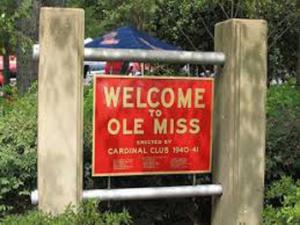
Ole Miss renames Confederate Drive as part of effort to embrace diversity and show sensitivity to the need to move away from it racist and divisive history. The University of Mississippi, which has long struggled to distance itself from plantation-era imagery, is renaming a street known as Confederate Drive and adding historical context to Old South symbols that have long stood on the Oxford campus.
"Our unique history regarding race provides not only a larger responsibility for providing leadership on race issues, but also a large opportunity - one we should and will embrace," Chancellor Dan Jones wrote in the report that was developed with the help of a university committee and outside consultants.
The report issued says Confederate Drive, a short street near Fraternity Row, will be renamed Chapel Lane and plaques could be installed to explain the history of symbols such as a Confederate soldier statue near the main administrative building.
The report recommends creating a new job of vice chancellor for diversity and inclusion. It also recommends that the university do more to tell the history of slavery, secession, segregation and their aftermath in Mississippi.
The report says the university will continue to use the nickname Ole Miss but should consider whether to limit its use to the context of athletics and school spirit, favoring the more formal University of Mississippi for academics. The nickname arose from a university yearbook contest in the late 1800s, but the phrase "Ole Miss" originally was a name that slaves used to refer to a plantation owner's wife.
"Our longstanding nickname is beloved by the vast majority of our students and alumni," Jones wrote in the new report. "A few, especially among our faculty, are uncomfortable using the term 'Ole Miss' - some at all, and some within the academic context. Some object simply because it is a nickname and prefer the more formal name, and some express concern about its origin, believing that the term is racist."
Coliseum Drive, near the basketball arena, will be renamed Roy Lee "Chucky" Mullins Drive, after a black Ole Miss football player who was left a quadriplegic by a 1989 game injury and died in 1991. The new name was recommended by athletic and alumni groups, Jones said.

The University of Mississippi had 22,286 students last academic year on its six campuses, including the main one in Oxford. In a state with a 37.4 percent black population, the university's enrollment was 15.4 percent black. The school's overall minority enrollment was 24.8 percent.
In 1962, two people were killed and more than 200 were injured when violence erupted because of the court-ordered enrollment of James Meredith as the first black student at the university. The university erected a statue of Meredith near the main administrative building, the Lyceum, in 2006. The university taught several courses in 2012 to commemorate the 50th anniversary of integration. But this past February, a noose and an old Georgia flag that included the Confederate battle emblem were found draped on the Meredith statue. A national fraternity suspended its University of Mississippi chapter after learning three members were responsible for the incident.
There were confrontations on campus after President Barack Obama was re-elected in November 2012, with about 400 students gathering outside while some shouted racial slurs. A larger group held a candlelight vigil on campus the next night to call for racial unity.
In the 1990s, Jones' predecessor as chancellor, Robert Khayat, banned people from carrying sticks into the football stadium as a way to discourage fans from carrying Confederate flags that had been waved at games for decades. Although its sports teams are still called the Rebels, the university a few years ago retired the Colonel Rebel mascot, a cane-wielding, white bearded old man who looked to many observers like the caricature of a plantation owner.
In 2009, Jones asked the university band to stop playing "From Dixie With Love," which blends the Confederate anthem, "Dixie," with the Union Army's "Battle Hymn of the Republic." The band had played the medley for about 20 years, but in about the mid-2000s, some fans started yelling "The South will rise again" during the song. Jones said in 2009 that the chant was associated with "a segregationist movement discredited so many years ago."
Online: University of Mississippi diversity report
Follow Emily Wagster Pettus on Twitter.
Copyright 2014 The Associated Press.
